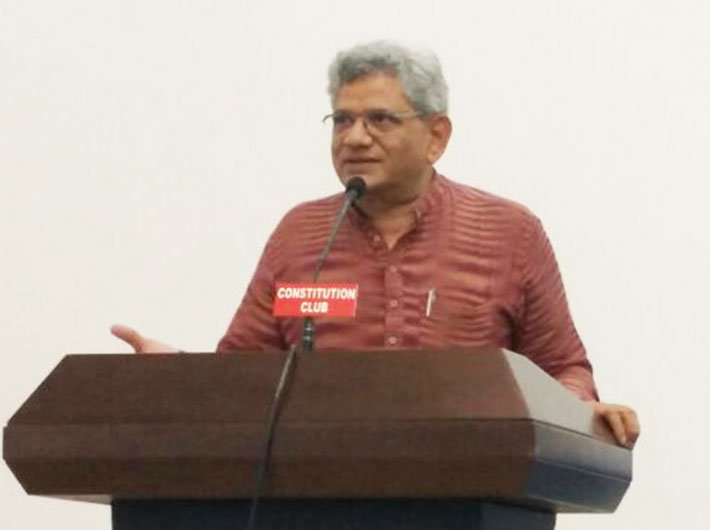A report shows that the private sector banks have managed to maintain low levels of non-performing assets (NPA) as compared to public sector banks
CPI (M) general secretary Sitaram Yechury said top ten corporate houses alone owe a staggering amount of Rs 7 lakh crore to banks and financial institutions.
Yechury, who had written a letter to the prime minister Narendra Modi in July urging him to come up with an action plan to monetise assets of defaulters, said he has not received any response from the PMO yet.
According to him, the huge amount of NPAs reflects the unstable situation of the banking sector. “If we ask for loan waiver for farmers who are committing suicide because of non-payment of a loan, that is not done. In the last one year, NPAs have grown tremendously. The government needs to come up with a plan on how these loans could be recovered. It needs to be recovered for building better infrastructure of the country,” he added.
Recalling his last meeting with Vijay Mallya, Yechury said: “He had planned his departure in the central hall of the parliament.”
Yechury was speaking at the panel discussion, organized in Delhi on Wednesday, to analyse the intricacies of non-performing assets (NPAs). He said the system is so weak that a person under so much of debt could easily leave the country. He indicated it is difficult to believe that government was unaware of Mallya’s plans.
The event was organised by Public Finance Public Accountability Collective (PFPAC), and a report ‘Unfolding crisis, the case of rising NPAs and sinking public accountability’ was also released. The report highlighted the state of banking and financial institutions in the country.
The poor accountability mechanism has reduced the banking sector, especially the state-run banks to weak financial institutions burdened with a huge debt of non-performing assets over the years. It has tremendously increased in the last few years. From a mere Rs 50,517 crore in March 2017, NPAs in banks have risen to over Rs 5 lakh crore in March 2016, the report highlighted.
The data compiled by the report shows that the private sector banks have managed to maintain low levels of NPAs as compared to public sector banks (PSBs). It further said that banks do not publicly disclose information on corporate loans such as date of sanctioning, interest rate, repayment period and deliberately hinder public understanding on the subject.
CH Venkatachalam, general secretary of All India Bank Employee Association (AIBEA), said that they have been demanding that willful defaulters should be declared a criminal offence. “It is alarming. Taking loan and making it bad has become and Industry in itself. It is a clear nexus of the politicians, banks and the corporate houses.”
He said that if a common man has to apply for retail loans then he has to go through so many procedures, but for corporate houses it is easy to get loan on the brand name. “Almost 70-80 percent of the profit of the banks is utilised in paying off bad loans. Bad loan is a political issue and product of the crony capitalism,” he added.
Highlighting the plight of farmers who are committing suicide due to debt, Swaraj Abhiyaan’s leader Yogendra Yadav said while there are guidelines issued by the government of India for issuing fresh loan to a farmer and re-scheduling of their loan in case of a natural calamity like drought, the actual implementation on ground is really poor. He said while the identity of the loan defaulters like big corporate houses are protected, farmers are openly harassed. “The names of defaulters are written on walls of tehsil office to publicly shame them. Also, there has been no re-scheduling of loans and no fresh loan has been issued to farmers in the state of UP.”
The report added that levels of NPAs are symptomatic of the inefficiency and limitations of the lending practices currently operational in banks. A closer look at the mechanisms conjured by the government and the RBI reveal that they are short-sighted and primarily meant to remedy situation of NPAs rather than proactively prevent their occurrence.
It also suggested that the government needs to establish a system of mechanisms to deal with lending. Also, the due diligence and risk assessment policies within banks must be reviewed and assessed for their efficiency.



